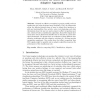194 search results - page 21 / 39 » Determine Task Demand from Brain Activity |
122
click to vote
DAC
2010
ACM
2010
ACM
A probabilistic and energy-efficient scheduling approach for online application in real-time systems
15 years 3 months ago
This work considers the problem of minimizing the power consumption for real-time scheduling on processors with discrete operating modes. We provide a model for determining the ex...
90
Voted
ECRTS
2005
IEEE
15 years 6 months ago
2005
IEEE
Low-level support of peripheral devices is one of the most demanding activities in a real-time operating system. In fact, the rapid development of new interface boards causes a tr...
108
click to vote
COST
2007
Springer
15 years 6 months ago
2007
Springer
The organization of a computational control model of articulatory speech synthesis is outlined in this paper. The model is based on general principles of neurophysiology and cognit...
109
Voted
AUSAI
2009
Springer
15 years 4 months ago
2009
Springer
Research on affective computing is growing rapidly and new applications are being developed more frequently. They use information about the affective/mental states of users to adap...
NN
2002
Springer
15 years 1 days ago
2002
Springer
Recognition-by-components is one of the possible strategies proposed for object recognition by the brain, but little is known about the low-level mechanism by which the parts of o...

